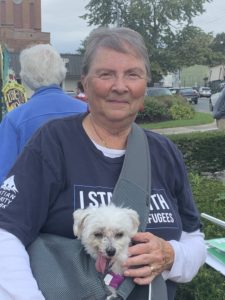Upper Room Community members recently joined other demonstrators in marching to the Rensselaer County Jail to protest the inhumane treatment of female immigrants being held there under a contract with ICE (Immigration Control Enforcement)
Category: Uncategorized
Liturgy Development and Co-Presiding for the Upper Room
How Are Liturgies Developed?
The progressive template for Upper Room liturgies was first developed for home liturgies and later organized for our community. Several more liturgies were composed by candidates in their study toward priestly ordination. Additional liturgies have been composed by several priests so that the Upper Room now has a rich trove of texts around a variety of themes for celebration of special seasons in the church year as well as ordinary time.
The liturgy format is a blend of our Catholic inheritance influenced by a progressive paradigm that honors inclusiveness, creation theology, social justice and the beliefs from our Statement of Faith. At times, presiders and co-presiders may rewrite opening or closing prayers or tweak parts of the liturgical prayer to hew to the theme of a particular Sunday more closely.
It is our practice to use one or more of the readings selected by the US Conference of Catholic Bishops. Doing so acknowledges that we pray in union with Catholics everywhere, even as we look forward to a future church in which the divine spark of every believer is honored equally. Priests and deacons research outside sources and scholarly commentaries on scripture to understand Jewish culture and ancient Hebrew scripture as well as the first century context of Christian scripture. Continuing study makes it possible to discover inspired sources outside of scripture for liturgies. (see below)
The priests and deacons meet monthly to pray together, consider the thematic approach to special seasons and holidays, tweak the language in liturgies, teach each other about best practices and emergent progressive theology. These meetings are inclusive in nature, balancing a need for uniformity with a desire to honor and respect different approaches by everyone in the group.
The Indispensable Role of Co-Presiders
If the Upper Room is to practice what we believe, then recognizing the role of lay presiders is crucial; we strive in liturgy celebration as in all our events to involve members as participants, not spectators. One of the drawbacks of the traditional church is treating an ordained vocation as superior to the vocation of lay people, forgetting that we are all a priestly people. Our community rejects this kind of clericalism.
We rely on every member to keep the Upper Room grounded in the divine inspiration and welcoming nature of the early church. Having a member of the community co-preside at Sunday liturgy is central to this vision of a non-hierarchical model. Drawing from our insightful membership helps the entire community arrive at the best decisions and richest celebrations.
The role of the lay co-presider in preparing for a liturgy celebration is flexible, depending on the comfort level of the co-presider; some may wish to read the eucharistic prayers but not feel ready to help in choosing readings and music or coming up with a theme for the day; others might be willing to write an opening and/or closing prayer; and some lay presiders may be willing to author the homily starter after discussion with the ordained presider.
We respect the special talents of each ordained presider and each lay presider to arrive at what works best each week. Together, the two (or more) presiders collaborate to ensure that the theme, prayers, music, readings and homily starter work together to create a worshipful experience steeped in a contemporary Catholic theology of blessing. Often, this partnership ends up reminding us of that basic truth that two minds are always better than one.
Frequently Consulted Sources for Presiding:
United States Conference of Catholic Bishops Readings for the day. www.usccb.org
The Inclusive Bible. The First Egalitarian Translation. Rowman & Littlefield, 2007.
Funk, Robert W. et al. The Five Gospels. The Search for the Authentic Words of Jesus. Macmillan, 1993.
Leach, Michael et al., editors. A Maryknoll Book of Inspiration. Readings for Every Day of the Year. Orbis
Books, 2010.
Merrill, Nan. Psalms for Praying. An Invitation to Wholeness. Continuum, 2006.
Additional writings by Henry Nouwen, John O’Donohue, Diarmuid O’Murchu, Richard Rohr, Joyce Rupp, John Shelby Spong and other contemporary scholars.
Explanations and Meditations on Mysteries of the Rosary
Please click on the down arrow next to the Companions Rosary Link in the sidebar Menu to access the materials for the various mysteries.
The Upper Room Will Sponsor Selected Non-Profits
Community Outreach Sponsorship
The Mission of the Upper Room states that we will minister to local and global needs. One of our Values is Social Justice and states that we will engage in local and global community outreach, protests and/or rallies, and charitable donations. The Upper Room Inclusive Catholic Organization will designate annually an amount of money from the reserve fund to be used to sponsor non-profit organizations in their mission and work. The amount(s) to be donated will be determined after the annual budget is approved in January and a reserve amount determined. The reserve amount and the amount donated may fluctuate annually and/or semi-annually.
Community members are encouraged to reach out to organizations that they think may benefit from these donations and ask that they consider applying. A simple application form is provided on our website. The applications will be reviewed by a vetting committee made up of Executive Board members and non-executive Board members. The vetting committee will make recommendations from these applications and ask that each organization prepare a short 5 to 10 minute presentation at the end of a liturgy. The vetting committee will send forward to the Board at its quarterly meeting the names of organizations they recommend for sponsorship. Amounts of the award will be determined by the Board based on the amount of the designated reserve fund and the needs of the organizations.
 Click images to enlarge
Click images to enlarge 